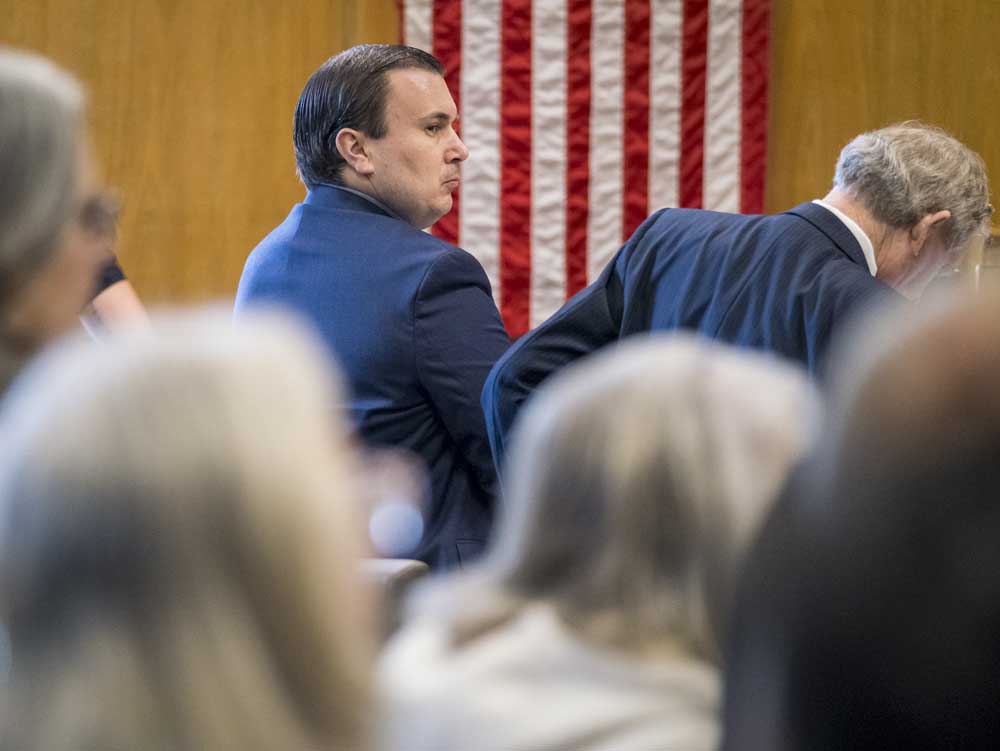Convicted former nurse’s alleged victims testify about challenges following brain damage
Published 6:02 pm Friday, October 22, 2021

- Charged with capital murder William George Davis listens to closing arguments as he stands on trial for the death of four patients at Christus Trinity Mother Frances in Tyler, on October 19, 2021, in the 114th District Court at the Smith County Courthouse. (Les Hassell/Tyler Morning Telegraph File Photo)
For decades, James Wages took the stage as an international world champion Elvis Presley impersonator performing in places like Mexico, Canada and Sweden.
Since his brain was damaged during an unexplained neurological event while recovering from heart surgery in Tyler, Wages can’t walk and he has trouble remembering a lot of information.
Now sitting in a wheelchair, Wages testified in court Friday as one of five victims prosecutors claim former nurse William George Davis tried to kill in 2017.
Davis, 37, of Hallsville, who worked at Christus Trinity Mother Frances Louis and Peaches Owen Heart Hospital, was convicted Tuesday of injecting air into the arterial systems and causing the deaths of John Lafferty, Ronald Clark, Christopher Greenaway and Joseph Kalina.
The sentencing phase, which began Wednesday, continued Friday. The jury is tasked with choosing between life in prison without parole or the death penalty.
Smith County District Attorney Jacob Putman on Wednesday told jurors the state would prove Davis also killed patients Perry Frank, James Sanders and James Blanks and attempted to kill Gary Parker, Pamela Henderson, Rickie Glenn, Wages and Jesus Serrano.
In 2018, Davis was charged with aggravated assault with a deadly weapon in connection with the injuries of Parker, Henderson, Glenn and Wages.
James Wages
Wages testified he recalled waking up from a lengthy coma, and he didn’t know what happened to him.
“I didn’t see. I saw black. I have severe brain damage because of it, and there are things I remember and things I don’t,” Wages said.
He told the jury his voice came back after time in therapy. Because of paralysis on his left side, Wages said he can’t walk.
He added that his peripheral vision is “destroyed.”
“I can’t read,” Wages said. “My brain doesn’t figure out the words.”
Dianna Kidwell, a nurse at the cardiovascular ICU, recalled being the nurse for Wages and they were both fans of Elvis.
She said Wages planned to sing her a song when he left the hospital. She testified his speech was clear as he woke up from surgery.
The next day, she found out he had a stroke overnight and said he was a totally different person. Wages wasn’t able to sing to her when he left, Kidwell testified.
A physician who reviewed Wages’ records said Thursday his brain damage was the result of an intentional injection of air into the arterial system.
Dr. Benjamin Krog, a cardiac anesthesiologist for Wages’ surgery, said he ensured there was no air in Wages’ arterial line before surgery and there was no concern of a stroke.
Gary Parker
Parker also took the stand to discuss the rehabilitation and difficulties he faced after his unexplained neurological event in 2017 while recovering from surgery.
Parker, who lives in Louisiana, said he came to Tyler for heart surgery because he was promised he could go back to work in three weeks. His career had been in creating decorative concrete for 25 years.
He recalled being taken from Tyler in an ambulance back to Louisiana, where he spent 45 days in a hospital for rehabilitation.
He testified he had to learn to walk again as the stroke-like event hit both sides of his body. He said it took him about a month before physicians could get him standing and walking.
“It was a long road to recovery. I spent two and a half years in rehabs,” Parker said. “I can’t walk very far without having something to lean up against.”
Before coming to Tyler for surgery, Parker testified he was 57 years old and 190 pounds. Since leaving the hospital, he said he “blew up” to 250 pounds and he can’t work like he used to.
Dr. Christopher Lowe, an anesthesiologist at Christus, testified Parker’s heart surgery was routine and he appeared to be recovering well. There were no indications an unexplained event would occur.
Records later showed Parker’s complications were caused by air injected into the arterial system.
Michelle Cazarez, a registered nurse at the cardiovascular ICU and Parker’s assigned nurse, said before his unexplained neurological event, Parker was talking and moving his hands.
After she was gone for a few minutes, she returned to see him in distress. She said he was not in the same condition.
Rickie Glenn
Glenn, of Henderson, recalled he came to his doctor for a routine appointment and due to abnormalities and he was taken to Christus TMF in Tyler. His next memory was leaving the hospital for rehab.
“I was told I’d never walk again,” he said.
Glenn, who had a welding career before his surgery, said he can’t weld anymore.
“I can’t control my hands. I have problems grasping things (and) holding things. I do almost everything with my right hand,” Glenn said. “Everything’s different now. I don’t take anything for granted anymore.”
On Thursday, a physician testified Glenn’s brain damage was caused by air injected into his arterial system.
Krog testified Glenn was in good shape prior to surgery, and he didn’t have serious illnesses that would cause concern. He said Glenn seemed to tolerate the anesthetic well, and he certainly had a routine surgery.
Cazarez, who was Glenn’s nurse, told the jury he was doing just fine until she walked to the bathroom. He was in distress when she returned and his heart rate was totally different.
She testified she asked Davis to watch Glenn while she was away. Cazarez said she had no concerns about Davis’ ability as a heart recovery nurse and she trusted him.
Jeff Roberts, a Tyler Police Department detective, returned to testify about part of a 2018 recorded phone call with Davis, in which they discussed Wages, Glenn, Frank and Parker.
Roberts testified during the interview Davis couldn’t recall information about those patients’ incidents. Davis did bring up a patient who had an incident that ultimately resulted in a good outcome.
The detective testified that was an example of another deflection he’d seen in other parts of their conversation.
Testimony will continue Tuesday, and sentencing deliberations could start Wednesday.






